What We Talk about When We Talk about Ensemble Theatre
Eighty years after its New York premiere in 1935, I went to see a new production of Waiting for Lefty in Oakland, California. Clifford Odets’s first play was produced along with his second Awake and Sing, which brought national attention to the Group Theatre in its fourth year of existence, and to the playwright. In the middle of the Great Depression, Odets and the Group were the first to bring the voices, struggles, frustrations, and dreams of working people and immigrants to the American theatre—both on the stage and in the audience.
I wasn’t sure what to expect from a 2015, site-specific version of Lefty by a young, diverse ensemble called Ubuntu Theatre Projects. I’d spent a few years researching the Group for a play I wrote about them, In the Maze of Our Own Lives, for the Traveling Jewish Theatre, an ensemble theatre I co-founded in 1978. I thought of Lefty as an unproducible, historical artifact full of overly earnest, archaic language.
When I saw Lefty and Dance of the Holy Ghosts by Marcus Gardley, another Ubuntu production, I knew I was experiencing ‘ensemble theatre.’ But like so much that’s deeply valuable, the term is notoriously hard to pin down.
Happily, those prejudices were shattered by what I saw in a downtown Oakland vintage auto shop. Unlike the Group’s Lefty, Ubuntu’s production included as many black actors as white ones. For all the Group’s 1930s progressivism, they never had an ensemble member of color.
The presence of actors of color was electrifying. The entire cast’s enormous skill at bringing Odets’ “archaic” language to life, their passion for the story, and their diversity made for a Lefty that speaks to our moment as clearly as the Group’s Lefty spoke to Depression-weary Americans in 1935.
As I learned more about Ubuntu from talking with its leadership, I began to see this three-year-old company as an heir to the movement in American theatre that began in 1931. Inspired by the productions that the Moscow Art Theatre brought to the US in 1929, Harold Clurman, Lee Strasberg, and Cheryl Crawford invited a number of out of work actors to spend the summer of 1931 working together outside the city. They were united by one vision of a theatre led by the artists themselves, dedicated to the creative process, giving voice to American stories and characters that were missing in the theatre of that time, which was dominated by plays from Europe, or homegrown imitations. They called themselves The Group Theatre.
Since then, the theatre movement the Group helped launch has gone by various names—experimental, engaged, alternative, etc. By the time I co-founded TJT with Albert Greenberg and Naomi Newman in 1978, we were calling it ensemble theatre.
Toward the end of the 90s, a handful of companies—Traveling Jewish Theatre, Bloomsburg Theater Ensemble, Cornerstone Theater Company, Dell'Arte International, Independent Eye, Irondale Ensemble Project, The Road Theatre Company, and Touchstone Theater—created the Network of Ensemble Theatres (NET) with enormous help from Phil Arnoult, Bob Leonard, and other “elders” of the movement. NET now lists over 160 member companies on its website. Part of their current manifesto says:
The most unique aspect of our work is that the primary decision-making power rests in the hands of the artists. Ensemble theatre is the antithesis of the corporate model that dominates the theatrical landscape in America today…
Until I learned the story of the Group Theatre, I’d assumed that what we call ensemble theatre sprung out of the avant-garde theatre and the political ferment of the 60s—Grotowski, Brook, The Living Theatre, The Open Theatre, and so on. After learning about the Group, I read accounts of their productions by writers of the 30s like Alfred Kazin:
Sitting in the Belasco, watching my mother and father and uncles and aunts occupying the stage in Awake and Sing by as much right as if they were Hamlet and Lear, I understood at last. It was all one, as I had always known. Art and truth and hope could yet come together... Odets convinced me.
How could I not claim them as ancestors?
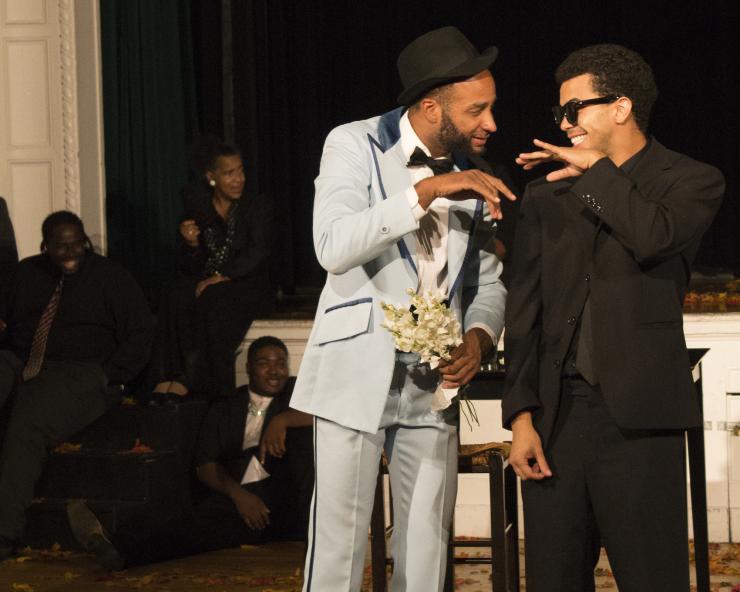
When I saw Lefty and Dance of the Holy Ghosts by Marcus Gardley, another Ubuntu production, I knew I was experiencing “ensemble theatre.” But like so much that’s deeply valuable, the term is notoriously hard to pin down. NET has wisely avoided using restrictive definitions of exactly what ensemble theatre is. Some ensembles have close ties to a specific community, others don’t. Some create original, devised theatre, while others only produce extant plays. Some have a clearly defined leadership, but others don’t.
I asked Heather Ramey, one of Ubuntu’s two associate artistic directors how she understood ensemble. “It means all hands on deck all the time. No one is undervalued.” Later, she described ensemble as a “strong belief in each other and a willingness to differ with each other…We have enough confidence [in each other] to be willing to be uncomfortable.”
William Hodgson, Ubuntu’s co-artistic director, told me that the culture of ensemble—the trust and full communication that Heather spoke about—is the foundation of Ubuntu’s theatremaking and its administrative work. “If we didn’t have the relationships we have in the office,” he said, “we wouldn’t have the work that we see on stage.”
The company’s choice of their name tells a story about their aspirations just as the Group Theatre’s did. Ubuntu is a Zulu word that has been used frequently by Nelson Mandela and Desmond Tutu among others. I asked founding co-artistic director Michael Moran to tell me it’s meaning. “Ubuntu means ‘I am because we are, my humanity is tied to yours.’ That awareness… requires compassion for the person on the other side, whoever that is, from whatever perspective. It’s a wonderful thing to try to live up to.”
Michael also told me that he and his childhood friend, Colin Blattel, managing director of Ubuntu, talked about starting a theatre company for many years. They both earned their BFAs at Boston University. After that, Michael moved to Chicago to pursue an acting career while Colin got an MA in Public Policy and Administration from Sacramento State University.
Riding public transportation in Chicago between his day job teaching developmentally disabled adults and rehearsals at night, Michael found himself reflecting on the bus driver—how integral to his day she was, and how grateful he felt that she did her job so well. He also responded to his fellow passengers:
They just seemed weary. Weary and worn. I was also pretty weary and worn. I would go to the theatre at night, from the North Side of Chicago to the South Side of Chicago…I felt the renewing capacity of theatre should be reaching these people on the bus. And it wasn’t reaching them.
These reflections inspired Michael to write a personal artistic statement. He developed those thoughts into an essay he sent with his application to the University of San Diego’s MFA directing program. In the essay, he imagined a theatre that “nourishes the soul’s yearning for communal and personal connection.”
While at UCSD, Michael shared with other theatre grad students his growing desire to make a theatre whose “renewing capacity” could reach the bus riders as well as the privileged. Similarly, Heather Ramey remarks, “We had an immediate connection as people and as artists. Michael is young and passionate...He wants to connect the world through theatre. I admire that passion and I believe in it.”
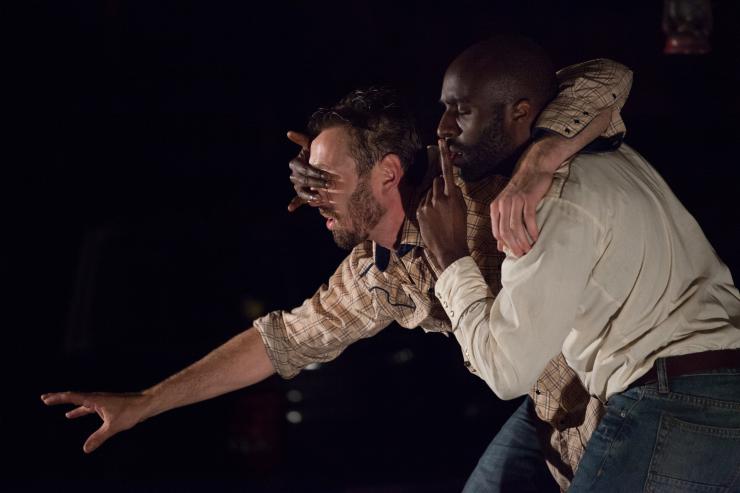
Michael and his colleagues began mounting extracurricular productions in San Diego, sometimes rehearsing between 11 p.m. and 2 a.m. For him, grad school was a gift and a privilege that he didn’t want to waste. He and his friends produced Dutchman, Yellowman, and Fool for Love among others.
In the summer of 2013, they brought their productions to Oakland, presenting them as Ubuntu’s first “Breaking Chains” Summer Festival. Michael notes, “although I may have convinced my colleagues to come up to the Bay, it was their generosity, courage and hunger for a sense of ensemble…that brought them here.”
The following year, they produced six plays with thirty-three students from UCSD trekking to the Bay Area. “Which,” Michael says, “was way too much and really insane and artistically very successful and personally problematic.” Then in 2015, they scaled back to a more manageable four-play festival that included Grounded by George Brant and The Brothers Size by Tarell Alvin McCraney, as well as Lefty and Dance of the Holy Ghosts.
In all three festivals, they performed in non-theatre spaces like a public merry-go-round, juvenile detention centers, garages, churches, and more. Michael says, “The main experiment was to see if could get audiences from the hills of Berkeley to come see a play there and then go to downtown Oakland and vice versa. To get people to have a different experience of one another. That actually worked.”
The choice of plays reflected a more nuanced position than it might seem. When I asked him about Ubuntu’s commitment to diversity, Michael said, “I think diversity is extraordinarily powerful and necessary but it’s part of larger quest for inspiring compassion. Our current mission statement is: ‘Ubuntu creates exquisite theatre experiences that inspire compassion.’ In order to inspire compassion, you have to see someone that you’re not. And then find some way to say, ‘Somehow, I am in them and they are in me. We are different but I have the capacity to suffer with them, walk with them; they have to capacity to suffer with me and walk with me.’”
When I spoke by phone with Co-Artistic Director William Hodgson, he was riding a train in Minneapolis, where he’s currently acting in Mixed Blood Theatre’s An Octoroon. Thanks to the many forms of long-distance, real-time communication now available, William has been able to join Michael in Oakland, Emilie in New Orleans, and Heather in LA as they plan their 2016 season—their first season to happen in non-summer months.
‘Ubuntu creates exquisite theatre experiences that inspire compassion.’ In order to inspire compassion, you have to see someone that you’re not. And then find some way to say, ‘Somehow, I am in them and they are in me. We are different but I have the capacity to suffer with them, walk with them; they have to capacity to suffer with me and walk with me.’
In spite of the geographic challenges, William sees benefits in working with a company like Mixed Blood with whom Ubuntu shares so many values. Jack Reuler, the founder and artistic director of the forty-year-old theatre was an important resource for William as he read plays that he and the others were considering for Ubuntu’s season.
For Ubuntu, ensemble is a fluid undertaking. Its composition has changed since the original San Diego cohort came together. Even though the current Ubuntu ensemble members are all based in the Bay Area, William says, “Everyone is welcome to come back at any point. The people we went to school with will always be our collaborators.”
I emailed Alisha Tonsic, executive director of NET, to ask if Ubuntu’s flexibility, and its openness to collaboration are shared by other ensembles. She replied:
A large number of ensemble artists are now choosing ongoing alignments and fluid memberships with multiple companies at once. This is having a very real impact on the sustainability of both the artists and the ensembles. Where previously a company may have disbanded as its members’ changing life needs moved them to different geographical locations, or financial realities led them to seek additional work elsewhere, the flexibility of these more porous structures can enable a company to weather these changes and continue to evolve together.”
As I was finishing this essay, I heard from Ubuntu that they’ve chosen the plays for their new, 2016 season. They are:
The Gospel of Lovingkindness by Marcus Gardley
Exit Cuckoo by Lisa Ramirez
I Am My Own Wife by Doug Wright
The Grapes of Wrath by Frank Galati
Más by Milta Ortiz
Hurt Village by Katori Hall
For now the company is continuing to work with extant plays, but Michael, William, and Heather all expressed hopes that they’d begin producing original, collaboratively created pieces. One project that they’ve been slowly developing is based on the housing crisis in Richmond, California—a few freeway stops north of Oakland. William Hodgson told me that one of the questions they’re asking is, “What are the stories that we need to tell as a group?”
Given enough time and support, I have no doubt that they’ll discover those stories. Maybe they already have. As I sat on one of the rough planks they’d brought into the vintage car garage for Lefty’s audience, I sensed an act of redemption taking place. By reimagining one of this country’s first engaged, experimental, ensemble theatre works, Ubuntu enlarged the Group’s original vision into one that can contain the multiplicity, and the perplexing richness of the audience that today’s theatre must reach if it is to survive.

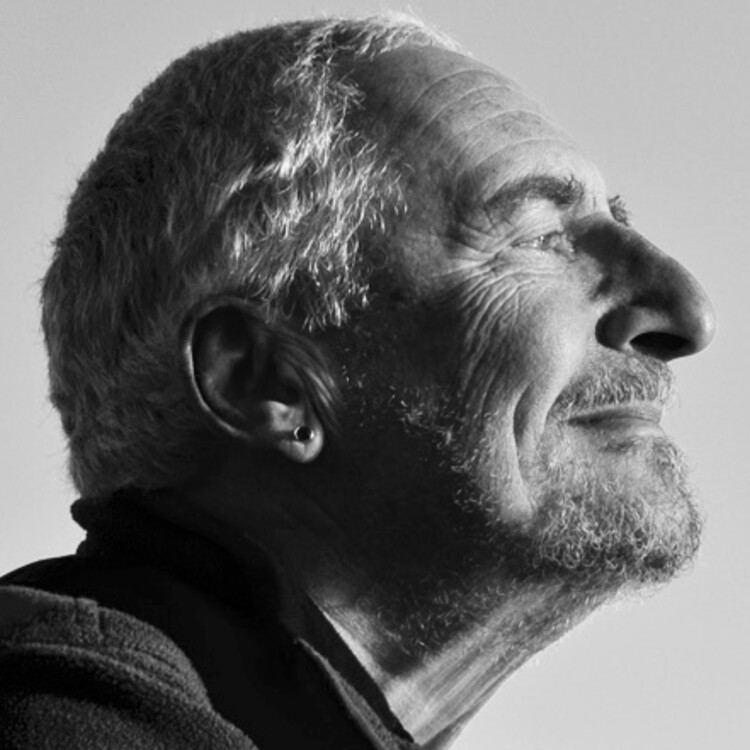
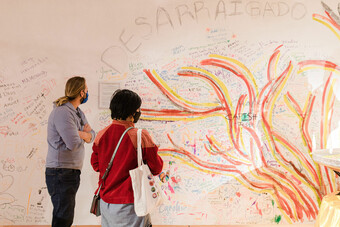

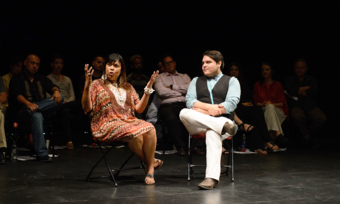


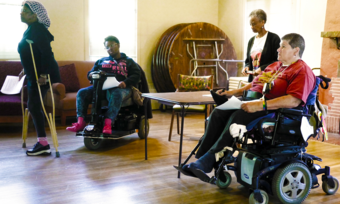

Comments
The article is just the start of the conversation—we want to know what you think about this subject, too! HowlRound is a space for knowledge-sharing, and we welcome spirited, thoughtful, and on-topic dialogue. Find our full comments policy here
Thoughtful piece Corey. Looking forward to seeing them in action!
I love this piece and the connection between the Group, NET, and Ubuntu. And I love Ubuntu, though I've never seen the company, from the astonished enthusiasm with which Corey attends them. Beautiful work about beautiful work--and the deepest connections.
Really inspiring; hopefully Ubuntu will be performing during my next trip back to the bay area. It always seemed the most logical path to me. I think the artisits then dictate the work chosen, and can then work with those that speak the same theater/artistic language - greatly facilitating the process. If I had to "recast" the members of the sales team I manage every 3-4 months (as is done in the commercial theater everywhere), starting from scratch all the time, we'd never achieve any long term goals.
Thanks, Corey, for the history and for the news! Great to read again about our ensemble roots (we founders of the Bloomsburg Theatre Ensemble were most certainly inspired by the Group), and great to hear that ensemble is flourishing in companies like Ubuntu!
You're so right, Andrew. It was the Road Company from Johnson City. I'm sure the HowlRounders will catch it. Thanks for the alert!
I may be mistaken, but the link provided to the Road Theatre Company... I don't think that was the Road Theatre Company that had a hand in creating NET. It was actually Bob Leonard's troupe The Road Company, and they were based out of Johnson City, Tennessee.